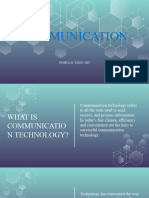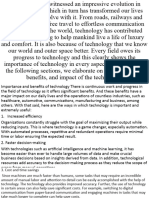20 Types of Technology: Definitions and Examples
Written by
Satwik Mishra
Updated January 29, 2025
There are many different types of technology, each with unique functions that aim to make certain processes more efficient. With a better
understanding of different types of technology, you can learn how each type of technology can help improve your daily life. This knowledge can
guide you when considering a career in technology.In this article, we discuss what technology is and list 20 common types of technology.
What is technology?
Technology is the product of transferring scientific knowledge to practical use. Different forms of technology came about from people trying to
find more efficient ways to do things and testing new ideas. Technology is constantly improving and generally aims to make processes easier for
people. For example, the internet makes communication easier and more efficient.Related: 12 Essential Technology Skills (And How To Improve
Them)
Upgrade your resume
Showcase your skills with help from a resume expert
Common types of technology
While a single piece of technology often overlaps into different areas, there are generally six different categories of technology:
1. Communication
2. Electrical
3. Energy
4. Manufacturing
5. Medical
� 6. Transportation
Here are the six different categories of technology with examples for each:
Communication
Communication technology consists of any technology people use to communicate with one another. Some early examples of communication
technology include Morse code and the telegraph. Below are some examples of more modern communication technologies:
1. Television
Television sets transmit signals we can listen to and view audio and visual content. People use television for entertainment, information and
news, advertisements and marketing, and educational purposes, among other activities. Most televisions receive signals from a cable wire or
over the internet, which relays signals that tell a television what content to display. The digital signals help compress the audio and visual data,
which helps optimize bandwidth usage, allowing for seamless high-definition content.
2. Internet
Many people consider the internet the most popular and powerful communication technology. It allows people from around the world to
interact through written messages and audio and video messages in real-time. The internet is a powerful tool for businesses, charities,
governments and individuals to use for marketing, communication and outreach, information broadcasting, social interactions and information
sharing.
3. Cell phones
Cell phones are a modern improvement over the telephone, enabling the transfer of text, audio, and video content over the internet. With a cell
phone, people can call other phones and converse with people worldwide. Cell phones are also equipped with applications that allow individuals
to easily access information from anywhere in the world, take pictures and videos, communicate globally over social media and perform their
professional duties. People can now use mobile devices to navigate, monitor their health, make payments, and integrate them with other smart
devices.























































































